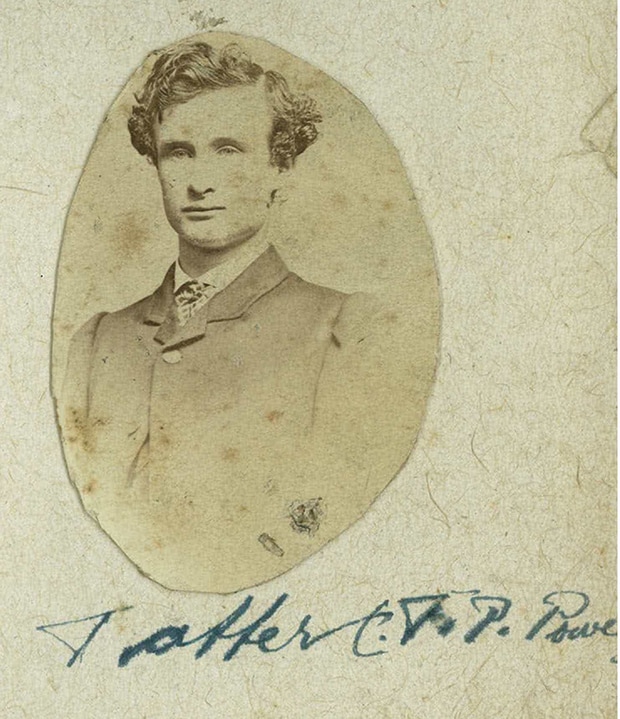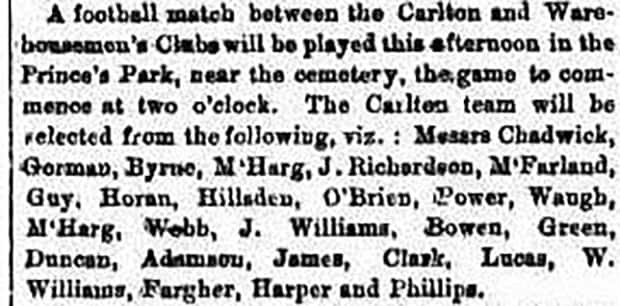It ended in a nil-all draw on a sodden area of parkland flanking the Melbourne General Cemetery.
It was played out on the afternoon of Saturday, June 10, 1865 – one hundred and fifty years ago today - and it involved two fledgling football teams.
One was known as The Warehousemen. The other, The Carlton.
Was this in fact the first official Carlton game ever recorded? Quite possibly, given that no team listings or match details appear to exist for any contests supposedly involving the club in its generally accepted foundation year of 1864.
Three weeks prior to the Carlton-Warehousemen encounter, a meeting of the good men of the club was convened at the University Hotel at the corner of Lygon and Grattan Streets. The Age correspondent noted that the meeting was held on Wednesday, May 17, 1865, “for the purpose of electing office bearers for the season, and adopting a code of rules for the guidance of the club”.
“Mr Waugh occupied the chair. The secretary was requested to communicate with James Linacre, Esq., asking him to accept the office of president of the club,” the writer noted.
“Mr John Walls was duly elected vice-president; and the following gentlemen the committee, namely: — Messrs Waugh, McLean, McHarg, Richardson, Bowen, Byrne, McFarland and Adamson; Mr B. James, secretary. After some consideration it was resolved to adopt the Melbourne Club rules.”
On the matchday morning of June 10, the names of a 26-man Carlton squad to meet the Warehousemen were published in The Age. Those grand men of stature from whom that historic team was selected included ‘Modest Dave’ Adamson, Frank ‘The Carlton Terror’ Hillsden, ‘Ol’ Ben’ James, ’Orlando ‘Lanty’ O’Brien, Tom Power and ‘Harry’ Chadwick, long considered this club’s first colonial captain.

Tom Power, one of the players for The Carlton.
The writer and historian Geoffrey Blainey, in his book A Game of Our Own: The Origins of Australian Football, recorded that the Warehousemen were “a gentlemanly version of the present Storemen and Packers and worked for importing firms whose warehouses were full of English hardware and textiles stood in Flinders Lane or near the riverside wharves”.
“The Albert Ground in St Kilda Road – in 1908 the scene of the first final of the Davis Cup to be held in Australia – was long known as The Warehousemen’s Cricket Ground,” Blainey wrote.
The drawn Carlton-Warehousemen contest was conducted on the same afternoon that the Civil Service also drew with the Customs Department, captained by H.C.A. Harrison, across town on the Richmond paddock.
An unnamed writer for The Age, in his reporting of the matches on Monday, June 12, lauded the winter game’s apparent revival.
“Football, which last winter was much neglected by that class of the community to whom out-door sports are almost a necessity, seems this year to be regaining something of the position to which it is entitled in the list of our manly pastimes,” the correspondent wrote.
“At the Royal-park, the Warehousemen’s Club met the Carlton Club, and here too a close game, was played, neither side succeeding in kicking a goal, though the game was continued till the coming night rendered it impossible to proceed further.
“On both grounds the drizzling rain, which began to fall about four o’clock, rendered foothold after that hour very precarious, and, as a consequence, some of the players got ugly falls — one, at the Royal Park, having the misfortune to break the cartilage of his nose.”
One hundred and fifty years on, The Warehousemen are long gone. But the young men of The Carlton still uphold the standards set by the freshmen of Princes Park in that historic maiden contest near the old Melbourne graveyard.

The team listing from The Age.
THE CARLTON v THE WAREHOUSEMEN
Saturday, June 10, 1865
THE CARLTON SQUAD:
David Adamson, George Frederick Bowen, James Byrne, Henry ‘Harry’ Chadwick, J. Clarke, Dr. Jim C. Duncan, Fargher, H.W Gorman, E. Green, John Henry ‘Harry’ Guy, Harper, Francis Hillsden, James Horan, Ben James, Lucas, Robert Huston McFarland, Andrew W. McHarg, Jack McHarg, Orlando T.L. ‘Lanty’ O’Brien, W. Phillips, Thomas Peter Power, J. Richardson, George Alexander Waugh, M. Webb, Jim Williams, William Cornelius Williams



